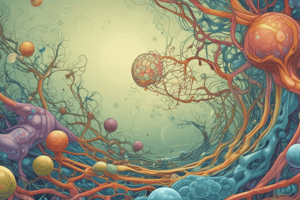Podcast
Questions and Answers
What is the basic structural and functional unit of all organisms?
What is the basic structural and functional unit of all organisms?
- Cell (correct)
- Organelle
- Nucleus
- Tissue
What is an organelle?
What is an organelle?
One of the small bodies specialized to perform a specific function in a cell.
What is a prokaryote?
What is a prokaryote?
A single-celled organism lacking a nucleus.
Define eukaryote.
Define eukaryote.
What is endosymbiosis?
What is endosymbiosis?
What is the function of the nucleus?
What is the function of the nucleus?
What is cytoplasm?
What is cytoplasm?
What does the rough endoplasmic reticulum do?
What does the rough endoplasmic reticulum do?
What is the role of smooth endoplasmic reticulum?
What is the role of smooth endoplasmic reticulum?
What is a cell wall?
What is a cell wall?
What is the function of a vacuole?
What is the function of a vacuole?
What does the cell membrane do?
What does the cell membrane do?
What is the function of the Golgi body?
What is the function of the Golgi body?
What is a ribosome?
What is a ribosome?
What is the function of lysosomes?
What is the function of lysosomes?
What do mitochondria do?
What do mitochondria do?
What is the nucleolus?
What is the nucleolus?
What is the nuclear membrane?
What is the nuclear membrane?
What is a nuclear pore?
What is a nuclear pore?
What is a phospholipid bilayer?
What is a phospholipid bilayer?
What does intracellular mean?
What does intracellular mean?
What does extracellular mean?
What does extracellular mean?
What is a concentration gradient?
What is a concentration gradient?
What is diffusion?
What is diffusion?
What is osmosis?
What is osmosis?
What is active transport?
What is active transport?
What is facilitated diffusion?
What is facilitated diffusion?
What does selectively permeable mean?
What does selectively permeable mean?
What is passive transport?
What is passive transport?
What is endocytosis?
What is endocytosis?
What is exocytosis?
What is exocytosis?
What is a hypertonic solution?
What is a hypertonic solution?
What is a hypotonic solution?
What is a hypotonic solution?
What is an isotonic solution?
What is an isotonic solution?
Flashcards are hidden until you start studying
Study Notes
Cell Basics
- Cells serve as the fundamental structural and functional unit in all living organisms.
- Organelles are specialized sub-units within a cell that perform distinct functions.
Cell Types
- Prokaryotes are single-celled organisms without a nucleus.
- Eukaryotes possess a nucleus and membrane-bound organelles.
Evolution of Cells
- Endosymbiosis suggests that early prokaryotic cells engulfed smaller cells, leading to the evolution of modern eukaryotes.
Key Cell Structures
- The nucleus houses DNA, overseeing cellular processes.
- Cytoplasm refers to the material within the cell membrane, excluding the nucleus.
- The cell membrane, a thin and flexible barrier, regulates the entry and exit of substances.
Endoplasmic Reticulum (ER)
- Rough ER is studded with ribosomes, involved in transporting proteins.
- Smooth ER participates in lipid synthesis, detoxification, and calcium storage.
Additional Organelles
- The cell wall provides structure and protection in plants, algae, fungi, and bacteria.
- Vacuoles store water, salts, proteins, and carbohydrates.
- Golgi bodies sort and package materials for transport inside or outside the cell.
- Ribosomes synthesize proteins, essential for cell function.
- Lysosomes contain enzymes for breaking down materials.
Energy and Metabolism
- Mitochondria convert stored food molecules into usable energy.
- The nucleolus is responsible for ribosome production and assembly within the nucleus.
Membrane Structures
- The nuclear membrane, highly porous, separates the nucleus from the cytoplasm.
- Nuclear pores allow for the exchange of substances between the nucleus and cytoplasm.
- The phospholipid bilayer forms the basis of plasma and organelle membranes.
Transport Mechanisms
- Intracellular processes occur within cells, while extracellular processes occur outside.
- A concentration gradient refers to differences in molecule concentration across a distance.
- Diffusion is the movement of molecules from areas of high to low concentration; osmosis specifically relates to water diffusion.
Active vs. Passive Transport
- Active transport requires energy to move substances against a concentration gradient.
- Facilitated diffusion utilizes carrier proteins to move substances along a concentration gradient.
- Selectively permeable membranes allow certain substances to pass while restricting others.
- Passive transport occurs without energy expenditure.
Cellular Movement
- Endocytosis allows cells to intake materials through membrane infolding.
- Exocytosis releases substances via vesicles that fuse with the cell membrane.
Solution Concentrations
- Hypertonic solutions contain a higher solute concentration compared to another solution.
- Hypotonic solutions have a lower solute concentration relative to a comparison.
- Isotonic solutions have equal solute concentrations, creating balance.
Studying That Suits You
Use AI to generate personalized quizzes and flashcards to suit your learning preferences.




